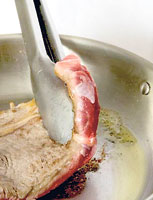Heart disease
Some red meats are high in saturated fat, which raises blood cholesterol. High levels of LDL (bad) cholesterol increase the risk of heart disease. The fat is in the skin and the muscle fibres in red meat, unlike in white meat like chicken where the fat is mainly concentrated in the skin. Fish oil is unsaturated and quite healthy for the heart.
Those who take statins orally to control the cholesterol within the normal range should not worry about it. But there are other concerns.
Cancer and red meat
Many researchers say red meat raises the risk of colorectal cancer.
A study conducted by National Institutes of Health - AARP on half a million older Americans concluded that people who ate the most red meat and processed meat over a 10-year period were likely to die sooner than those who ate smaller amounts. Those who ate about four ounces of red meat a day were more likely to die of cancer or heart disease than those who ate the least, about half-ounce a day.
 |
| Images courtesy Getty |
The meat industry contends there is no link between red meat, processed meats and cancer and that lean red meat fits into a heart-healthy diet. A meat industry spokeswoman criticized the design of the NIH-AARP study, alleging that studies that rely on participants to recall what foods they eat cannot prove cause and effect.
"Many of these suggestions could be nothing more than statistical noise," said Janet Riley, a senior vice president of the American Meat Institute, a trade group.
After a systemic review of scientific studies, an expert panel of the World Cancer Research Fund and the American Institute for Cancer Research concluded in 2007 that "red or processed meats are convincing or probable sources of some cancers". Their report says evidence is convincing of a link between red meat, processed meat and colorectal cancer and limited but suggestive for links to lung, esophageal, stomach, pancreatic and endometrial cancers.
- Saturated fat in red meat is linked to cancers of the colon and breast
- Carcinogens are formed when meat is cooked
- Heme iron, the type of iron found in red meat, produces compounds that can damage cells, leading to cancer.
Nutritional benefits of red meat
In spite of the risks mentioned, the iron in red meat helps teenage girls and women during their childbearing years to increase the amount of haemoglobin in the blood. Theme iron in red meat is easily absorbed in the gut and supplies vitamin B12 which helps make DNA and keep nerves and red cells healthy and zinc which keeps the immune system working efficiently
Red meat provides proteins for muscles and bone build up.
Three ounces of lean beef contributes only 180 calories and provides 10 essential nutrients suitable for low-calorie diets.
Pork is considered a red meat and not white meat, as sometimes advertised, due to the high myoglobin content.
It is advised that you should eat 5 to 6 ½ ounces of protein from a variety of sources, including lean meats, nuts and seafood daily. The amount of cooked red meat allowed is 18 ounces a week, according to the American Institute of Cancer Research. The amount of protein you eat from meat per day should be the amount in a standard-size burger. It is advisable to avoid sausages, deli meats, hot dogs, ham and bacon.
 |
| Images courtesy Getty |
The best cuts in red meat are the "loin"- Sirloin tip steak, top sirloin, pork tenderloin, lamb loin chops. In pork – lean cuts include loin roasts, loin chops and bone-rib chops.
By definition, lean means that a three-ounce serving should contain less than 10 grams of total fat, 4.5 grams or less of saturated fat and less than 95 milligrams of cholesterol. Beef from grass-fed cattle also contains small amounts of omega-3 fatty acids
Some ref: WebMD Better Health
Tips on cooking meat
- Don't overcook meat. Well done meat contains more of the cancer-causing compounds.
- If grilling, cook over medium heat or indirect heat, rather than over high heat. Limit frying and broiling, which also subject meat to high temperatures.
- Don't grill chunks of meat. Instead of a steak, try kebabs that mix meat, fruit and vegetables.
- Trim fat from meat before cooking and remove any charred pieces before eating.
- Consider partially cooking meats and fish in the oven or microwave before finishing on the grill.
|


